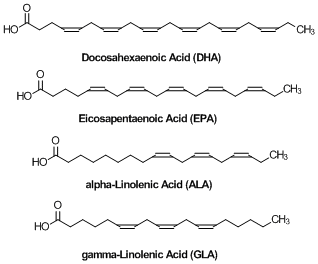Are the flaxseed oil benefits worth it?
Vegans and vegetarians have been sold on flaxseed oil benefits for years. In fact, people who choose not eat meat or fish are in a bind over omega-3's. How can you get the stuff that is only in fish without eating fish? A common answer claims that flaxseed oil offers omega 3 benefits to the body in the same way fish oil does. Unfortunately, flaxseed oil is not a good substitute for fish oil in the diet. In this article we'll explain why flaxseed oil doesn't make the cut for omega-3 health benefits and we'll offer a real vegetarian alternative to fish oil.
What does flaxseed oil have going for it?In fact, flaxseed oil does contain alpha-linolenic acid (ALA), which is an omega-3 fatty acid. Our diets have evolved to have very high omega-6 to omega-3 ratios, on the order of 15:1 (LINK to omega 3 6 9). So any omega-3 supplementation in your diet is, in principle, a good thing. And indeed, in some areas studies have shown flaxseed oil benefits similar to fish oil.

But where does flaxseed oil come up short?
Flaxseed oil contains no DHA or EPA. These are the two compounds in fish oil that give the benefits to the brain and body, respectively. The argument used in favor of flaxseed oil is that the ALA in flaxseed oil is converted to EPA and then DHA in the body. While this pathway does exist, studies show that a only small percentage (<10%) of ALA is converted to EPA, and less than 1% goes on to DHA (Discussed in 1). Think of it more as a biochemical path through the woods than an interstate. So if you are taking flaxseed oil, you are missing out on some import nutrients. In fact, a broad, systematic review recently concluded that flaxseed-derived ALA did NOT provide the cardiovascular disease benefits afforded by fish oil-derived DHA and EPA (2).
Also, flaxseed oil has traces of funny little compounds called lignans. Lignans are squirrely little molecules often as building blocks in the body. While lignans may have some anti-cancer properties, they are also phytoestrogens. For this reason, I recommend that women not take flaxseed oil during PMS time. Also, lignans are what cause flaxseed oil to go rancid. If you take flaxseed oil, you need to refrigerate it because the breakdown products are not good for you at all.
What is the vegetarian alternative to fish oil?
Completely vegetarian DHA can be made from algae. In fact, all the DHA that goes into baby formula (infant brains need lots of it) is produced from algae. Some products exist that have flaxseed oil with algae-derived DHA, a good compromise. You won't, however, be getting your EPA needs met. As an EPA substitute, borage oil is high in gamma linoleic acid (GLA), which performs a similar anti-inflammatory function in the body.
Borage oil offers similar flaxseed oil benefits
The bottom line:
The health benefits of fish oil vastly outweigh the flaxseed oil benefits. If you don't want to take fish oil, take vegetarian DHA and borage oil. Your mind and body will thank you later.![]()
References:
1. Russo, GL. "Dietary n-6 and n-3 polyunsaturated fatty acids: From biochemistry to clinical implications in cardiovascular prevention." Biochem. Pharmacol. 77 (2009) 937-46.
2. Wang, C, Hassis, WS, Chung, M, et al. "n-3 Fatty acids from fish or fish-oil supplements, but not a-linoleic acid, benefit cardiovascular disease outcomes in primary- and secondary-prevention studies: a systematic review." Am J Clin Nutr. 84 (2006) 5-17.


